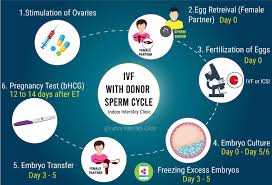Sperm donation is a vital option for individuals or couples seeking to conceive but facing infertility challenges or for those in same-sex relationships who require assistance to start a family. The process involves a male donor providing sperm, which is then used in fertility treatments such as intrauterine insemination (IUI) or in vitro fertilization (IVF). This article delves into the sperm donation process, its benefits, and the important considerations for both donors and recipients.
What is Sperm Donation?
Sperm donation is the process where a man donates his sperm for the purpose of artificially inseminating a woman who is not his sexual partner. Donated sperm can be used by women who cannot conceive naturally, by same-sex couples, or by single women who wish to have children. Fertility clinics typically collect, screen, and store sperm for future use.
The Sperm Donation Process
Screening and Testing: Potential sperm donors undergo rigorous health screening to ensure they are free from infectious diseases, genetic disorders, and other potential risks. Medical histories, blood tests, and semen analyses are conducted to verify the donor’s suitability.
Donation and Storage: After passing the screening process, the donor provides a sample through ejaculation at a clinic or sperm bank. The sperm is frozen and quarantined for six months or longer to ensure there are no underlying diseases. Once cleared, the sperm is stored for future use.
Insemination or IVF: Donated sperm is typically used in artificial insemination or IVF procedures, depending on the recipient's fertility condition. In some cases, sperm may also be used for egg fertilization in a lab.
Benefits of Sperm Donation
Helps Infertile Couples: Sperm donation provides an opportunity for infertile couples to conceive when male infertility is a challenge. It opens the door to parenthood for individuals who might not otherwise have had the chance to conceive naturally.
Assists Same-Sex Couples and Single Women: Sperm donation is particularly beneficial for same-sex female couples and single women looking to start a family. It allows them to have biological children using donor sperm, whether through IUI or IVF.
Advancement in Family Planning: Sperm donation provides options for individuals with certain genetic conditions who want to avoid passing them on to their offspring. By using donor sperm, they can ensure healthier outcomes for their children.
Financial Compensation for Donors: While not the primary motivation for most donors, sperm donation usually comes with financial compensation, providing an incentive for those willing to contribute to helping others start a family.
Considerations for Donors and Recipients
Legal and Ethical Aspects: The legal framework surrounding sperm donation varies across regions and countries. It's important for donors and recipients to understand the legal implications, such as parental rights and responsibilities. In some countries, donors remain anonymous, while in others, the child has the right to know the donor’s identity once they reach a certain age.
Emotional Considerations: For donors, knowing that their genetic material may be used to conceive children can bring emotional challenges. Recipients may also experience emotional complexities related to using donor sperm, particularly when the donor is anonymous. Counseling is often recommended to address these feelings.
Medical Considerations: Medical screening is thorough for donors, but recipients should also be aware of potential genetic or health risks associated with donor sperm. Fertility clinics provide comprehensive testing, but there are still inherent risks in any fertility process.
Donor Anonymity vs. Identity Disclosure: Some sperm donors choose to remain anonymous, while others may agree to identity disclosure. Recipients need to consider the long-term implications of this decision, particularly if children conceived through sperm donation wish to learn more about their biological origins.
















